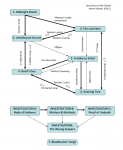Quickleaf
Legend
I've got this scenario I'm putting together based on a mystery, and I'm trying to find a good way to represent that in 4e.
It's a "find the vampire killer" scenario with five suspects, and I have tons of info written up a out each suspect, how they fit the classic vampire tropes (abhor sunlight, no reflection/shadow, longevity), potential motives, alibis, etc.
How have you handled investigation scenarios in your game?
My approach is leaning toward a logic puzzle & 3-part skill challenge combination. The logic puze has clues strewn through various encounters (automatically gained by completing the encounter), that allow PCs to use process of elimination with the suspects. The skill challenge is more freeform, letting the PCs pursue the various parts at their own pace; successes point toward hints about the murder, while failures provide red herrings. Regardless of whether each part is successful or a failure overall, the PCs learn what they need to progress to the next part of the investigative skill challenge.
It's a "find the vampire killer" scenario with five suspects, and I have tons of info written up a out each suspect, how they fit the classic vampire tropes (abhor sunlight, no reflection/shadow, longevity), potential motives, alibis, etc.
How have you handled investigation scenarios in your game?
My approach is leaning toward a logic puzzle & 3-part skill challenge combination. The logic puze has clues strewn through various encounters (automatically gained by completing the encounter), that allow PCs to use process of elimination with the suspects. The skill challenge is more freeform, letting the PCs pursue the various parts at their own pace; successes point toward hints about the murder, while failures provide red herrings. Regardless of whether each part is successful or a failure overall, the PCs learn what they need to progress to the next part of the investigative skill challenge.
Last edited:




